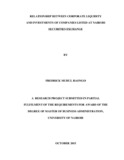| dc.description.abstract | A company must preserve adequate amount of liquidity to meet its daily obligations, but
liquidity in excess of what is adequately required by the company to finance it operations
may be counter-productive. The optimal investment in liquidity increases the cost of
external financing, the variance of the future cash flows, and the return on future
investment opportunities, while is decreases the difference between the firm’s physical
assets and the liquid assets. In most cases investors demand a premium for securities that
have a longer maturity period, this entail a high risk since most investors prefer to hold
cash which is less risky. The study sought to establish the relationship between corporate
liquidity and investments of companies listed in Nairobi Securities Exchange. A
descriptive research design was applied in this study. The population of interest in this
study consisted of 54 firms quoted in the Nairobi Securities Exchange. In this study
emphasis was given to secondary data which was obtained from the financial statements
covering the years 2010-2014 for companies investments, current assets, current liability,
companies’ debts/equity and the total assets of which are publicly available. In order to
test the relationship between the variables, the inferential tests including regression
analysis was used to determine the effect of corporate liquidity on investments. The study
found that the liquidity, leverage and firm size contribute to 66.5% of investments and
that a unit increase in liquidity leads to a 0.098 increase in investments. The study
concludes that corporate liquidity affects the level of investments of companies listed in
the NSE. The conclusion is that corporate liquidity has a positive and significant effect on
investments of companies listed in the NSE for the period of this study. The study
recommends that adequate funding should be directed towards investments for optimum
structure of the liquidity, and to make a proper balance between liquidity and
investments. The study suggests that research should be extended to none listed
companies and also for longer period of time. Inclusion of none listed companies may
help in elimination of any biasness that may be associated with listed companies as listed
companies are also regulated by Capital Market Authority. | en_US |

